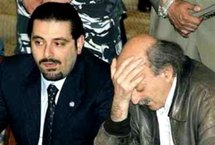
Walid Jumblatt with Saads Alhariri
His comments follow press reports implicating the militant group Hezbollah in the murder of Sunni ex-premier Rafiq Hariri, who was killed in 2005 along with 22 others in a massive seaside bombing.
According to unconfirmed reports, high-ranking Hezbollah members stand to be accused by the Special Tribunal for Lebanon (STL) for the murder.
The militant party has warned against such an outcome, sparking fears of a sectarian conflict between supporters of current Lebanese premier Saad Hariri -- son of the slain ex-premier -- and the Shiite Hezbollah.
The Canadian Broadcasting Corporation (CBC) aired a documentary Monday citing unidentified sources saying UN investigators had evidence that "points overwhelmingly" to the involvement of members of the Shiite militant group.
The prosecutor of the STL, Daniel Bellemare, on Tuesday criticised the CBC report and warned it could endanger lives.
"The most serious impact of the CBC reports is that their broadcast may put people’s lives in jeopardy," Bellemare said in a statement.
He was "extremely disappointed" by the broadcast, he said.
Jumblatt said the rumours and press reports surrounding the STL probe and its findings had become "a dangerous soap opera" that threatened Lebanon's stability.
"It is clear that this probe is being used for political purposes," he said. "It is clear that the investigators are leaking information and are working for countries that have accounts to settle."
He added that Lebanon's politicians would do better to address mounting extremism in certain regions of the country rather than focus on the Hariri tribunal.
"The real danger facing Lebanon is the rise of extremist groups and the political class should stop being distracted by these endless arguments over the tribunal and face the real danger," Jumblatt said.
The hereditary chieftain of Lebanon's Druze minority pulled a political about-face last August from the Hariri-led coalition he helped create in order to move closer to the Hezbollah-led opposition supported by Syria and Iran.
He defended his move as necessary to preserve peace and avoid sectarian bloodshed.
----------------------------------------------------------------------------
According to unconfirmed reports, high-ranking Hezbollah members stand to be accused by the Special Tribunal for Lebanon (STL) for the murder.
The militant party has warned against such an outcome, sparking fears of a sectarian conflict between supporters of current Lebanese premier Saad Hariri -- son of the slain ex-premier -- and the Shiite Hezbollah.
The Canadian Broadcasting Corporation (CBC) aired a documentary Monday citing unidentified sources saying UN investigators had evidence that "points overwhelmingly" to the involvement of members of the Shiite militant group.
The prosecutor of the STL, Daniel Bellemare, on Tuesday criticised the CBC report and warned it could endanger lives.
"The most serious impact of the CBC reports is that their broadcast may put people’s lives in jeopardy," Bellemare said in a statement.
He was "extremely disappointed" by the broadcast, he said.
Jumblatt said the rumours and press reports surrounding the STL probe and its findings had become "a dangerous soap opera" that threatened Lebanon's stability.
"It is clear that this probe is being used for political purposes," he said. "It is clear that the investigators are leaking information and are working for countries that have accounts to settle."
He added that Lebanon's politicians would do better to address mounting extremism in certain regions of the country rather than focus on the Hariri tribunal.
"The real danger facing Lebanon is the rise of extremist groups and the political class should stop being distracted by these endless arguments over the tribunal and face the real danger," Jumblatt said.
The hereditary chieftain of Lebanon's Druze minority pulled a political about-face last August from the Hariri-led coalition he helped create in order to move closer to the Hezbollah-led opposition supported by Syria and Iran.
He defended his move as necessary to preserve peace and avoid sectarian bloodshed.
----------------------------------------------------------------------------









 Home
Home Politics
Politics









